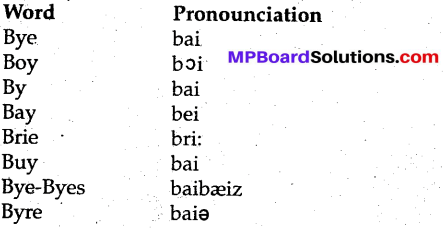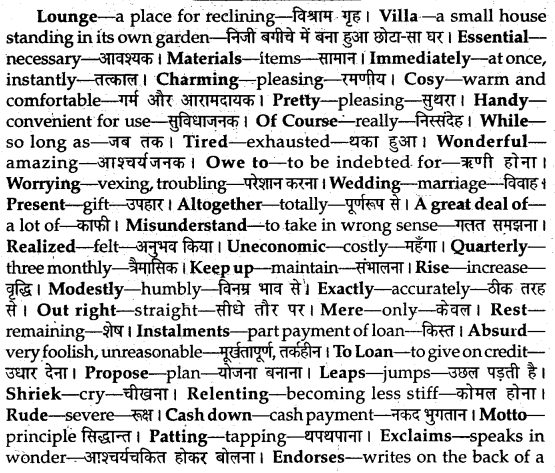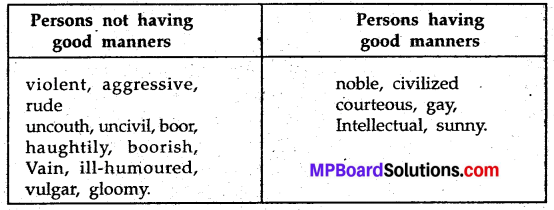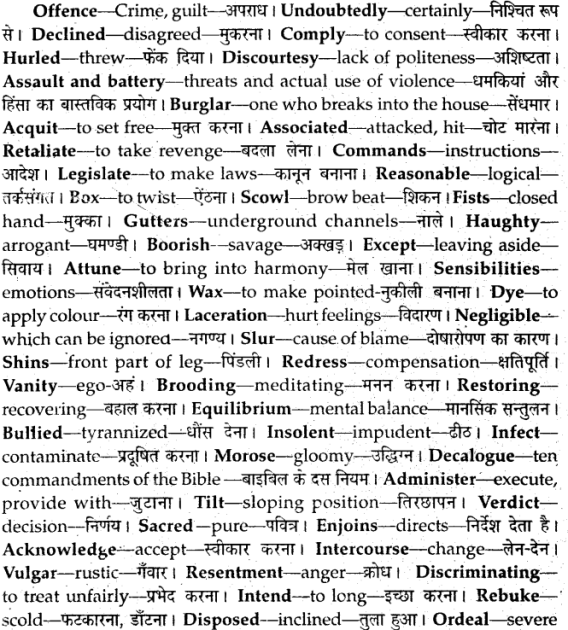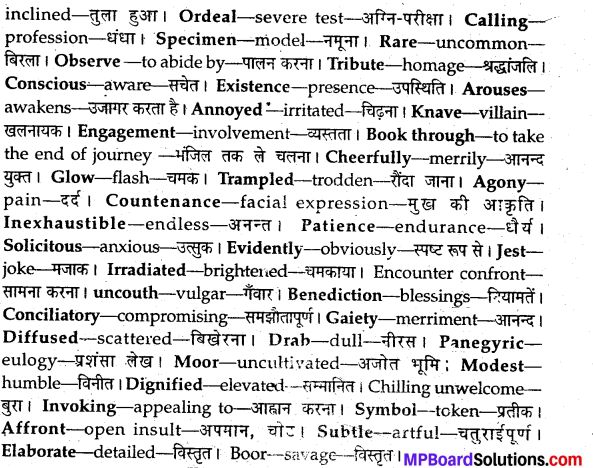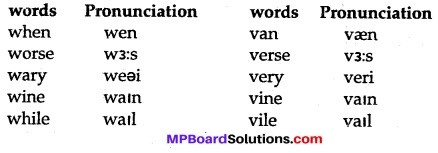MP Board Solutions for Class 9 English The Rainbow Workbook Solutions Chapter 7 The World is Too Much with Us Questions and Answers aids you to prepare all topics in it effectively. You need not worry about accuracy of Madhya Pradesh State Board Solutions for Class 9 English Chapter 7 The World is Too Much with Us as they are given adhering to the latest exam pattern and syllabus guidelines. You Can Download MP Board Class 9 English Solutions Questions and Answers, Notes, Summary, Guide pdf on is page. Enhance your subject knowledge by preparing from Chapterwise MP Board Solutions for Class 9 English and clarify your doubts on corresponding topics.
MP Board Class 9th English The Rainbow Workbook Solutions Chapter 7 The World is Too Much with Us
Kick start your preparation by using our online resource Madhya Pradesh State Board Solutions for Class 9 English The Rainbow Workbook Solutions Chapter 7 The World is Too Much with Us. You can even download MP Board Solutions for Class 9 English free of cost rough direct links available on our page. Clear your queries and understand concept behind in a simple manner. Simply tap on concept you wish to prepare chapterwise and go rough it.
The World is Too Much with Us Vocabulary and Pronunciation
A. Quote a few lines from a poem where the poet express serious thought in simple, delightful and direct words.
Answer:
Little we see in Nature that is ours. We have given our hears away, a sordid boon. For this, for everything, we are out of tune. It moves us not – Great god I’d rather be.
B. What do you mean by ‘octave’?
Answer:
Octave : the difference between the first and last notes in a serious of eight notes on a scale.
C. Match column ‘A’ column ‘B’
A – B
- sordid – everything that exists in the world
- howling – an open piece of grassy land
- nature – noise made by a strong mind
- lea – poor.
Listening Skill
Listen to the lines of the following poems.
After listening to the poem recollect the poem and answer the following questions .
Question 1.
What is the first line of the poem ?
Answer:
Dear water clear water, playful in all your streams.
Question 2.
What qualifying words have been used for water ?
Answer:
Clear, dear, playful, pure.
Question 3.
‘The most well-spoken’, the words have been used for ……….
Answer:
The oldest servant.
Question 4.
Who is one of the older servants of Mrs. Nature ?
Answer:
Water.
Speaking Skill
Wordsworth, in his poem ‘The worlds is too much with us’ says that one should not merely think of earning and spending. What else one should and shouldn’t think?
See workbook page 55.
Reading Skill
Read the given stranzas carefully and answer the questions given below it.
See workbook page 56.
Question 1.
Complete the following statements :
(a) By the word ‘Care’ in line one, the poet means.
Answer:
Excess attention/ highly protective.
(b) When the poet say “No time to stand and stare”, he wants to convey that ……………….
Answer:
He has so many duties to discharge and therefore he does not get time to look at the beauty of nature.
(c) In stanza one ‘we’ refers to ……………..
Answer:
Human beings.
(d) The sheep and cows being free from have the time to …………….
Answer:
Worries, state as long as they wish.
Question 2.
Which words have been repeated several times? Why?
Answer:
No, time, stand, stare.
Question 3.
The poet has used capital letter ‘B’ to talk about “Beauty” in the line “No time to turn at Beauty’s glance”. Why?
Answer:
Here, the poet personifies beauty.
Question 4.
Pick out the words from the poem which have the following meanings.
(a) a feeling of worry of anxiety of tension
(b) wait and watch.
(c) an area of trees or small forests
(d) casting of momentary looks
Answer:
(a) care
(b) stare
(c) wood
(d) glance.
Writing Skill
A. Find any advertisement from the Ministry of Health and Family Welfare, Delhi.
Write a letter to your uncle, in the light of that advertisement, suggesting him to follow the precautions (50 words).
Answer:
My Dear Uncle
You might have seen advertisement issued for public by the Ministry of Health and Family Welfare Delhi warning to be precautions against spread of Dengue. It is a deadly disease. So take safety measures. Avoid contamination of water. Use mosquito repellents. Keep all doors and windows dose in evening. I am very serious about it. Don’t worry for me.
Yours
Rakesh.
B. Is money everything in life? Write your views. (150 words)
Answer:
Money has become the most vital factor of life these days. We can’t live without it. It is the basic need. In this materialistic
age we have to buy everything that. We need in our day to day life. There was a time when people used to get things through barker system. But it is not in practice. It has become an age old tale. We can’t think of a life if we have no money. Moreover it also establishes our identity in society. It gives a good status. It one has no money one will not get a good position do it is time to say money is everything in life.
We believe the information shared regarding MP Board Solutions for Class 9 English The Rainbow Workbook Solutions Chapter 7 The World is Too Much with Us Questions and Answers as far as our knowledge is concerned is true and reliable. In case of any queries or suggestions do leave us your feedback and our team will guide you at soonest possibility. Bookmark our site to avail latest updates on several state board Solutions at your fingertips.


